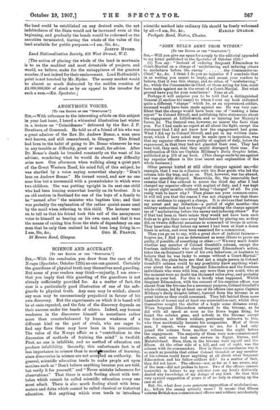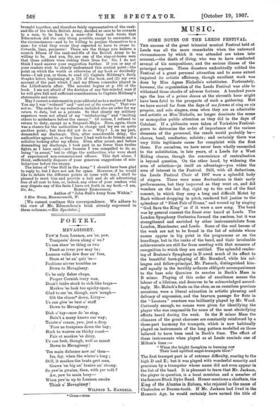"JOHN BULL'S ARMY FROM WITHIN." ['ro THE EDITOR OP THE
"SPECTATOR.'] SIR,—Will you give me space for a reply to the editorial appended to my letter published in the Spectator of October 12th?
(1) You say : "Instead of ordering Sergeant Edmondson to Court-Martial on a charge of 'misbehaving and inducing others to misbehave before the enemy' the Comniander-in- Chief," &c., &c. I think I do you no injustice if I conclude that in so writing you meant to imply, and meant your readers to believe, that it was this charge, and no other, of "misbehaving," &c., which the Commander-in-Chief, or those acting for him, must have made against me in the event of a Court-Martial. But what ground have you for your conclusion ? None at all. Perhaps it will surprise you to be told that a distinguished General (I enclose his name) to whom I sent my book indicated quite a different "charge" which he, as an experienced soldier, assumed would have been made against me. He was very con- fident that the charge would have been one of "making a false report" to Colonel Sitwell, and publishing false statements about the engagement at Lilliefontein, and so injuring her Majesty's forces, &c. The General was, however, no nearer the facts than you. For I had made no report at all about the fight, except the statement that I did not know how the engagement had gone. What I did say to Colonel Sitwell, and put in my written state- ment, which I have asked may be made open to inspection, was that my superior officers were guilty of neglect of duty, before the engagement, in that they had not guarded their rear. They had been told, they said, that they might disregard their rear. For confirmation of this see Captain Mildmay's Daily Graphic letter, published at p. 176 of my book. (This charge made by me against my superior officers is the true secret and explanation of the whole business.) Other persons hinted at still other charges against me,-..for example, that I was in collusion with the Boer guide who led the column into the trap, and so on. That, however, was too absurd, and was speedily dropped. Meanwhile, Sir, the immovable fact remains that I was ordered to arrest the third day after I had charged my superior officers with neglect of duty, and I was kept in arrest eight months without being "charged" at all. Do you really wish to know why ? Then please use your common-sense. It will tell you that the reason I was not charged was that there was no evidence to support a charge. It is obvious that between my arrest and my reduction—a period of eight months—the military authorities had no thought of making the charge against me of "misbehaving before the enemy and inducing others.' For if that had been in their minds they would not have been such fools as to give their case away beforehand by placing me, as they did, on twelve different occasions in command of troops in action. They knew also that before my arrest I had been at least a dozen times in action, and even been examined for a commission.
Then you go on to say, with a great show of judicial fairness— forgive me, I find you as determined as some others to prove me guilty, if possible, of something or other :—" We very much doubt whether any member of Colonel Grenfelrs column, except the fourteen individuals who shared Sergeant Edmondson's action, takes the ex-Sergeant's view of his own behaviour, or hesitates to believe that he was lucky to escape without a Court-Martial." Well, Sir, the plain facts are that not a single person in Colonel Grenfell's column could by any possibility know anything what- ever about the action of Sergeant Edmondson and the fourteen individuals who were with him, any more than you could, who at the moment were no doubt ten thousand miles away; and probably asleep in your bed. For this is briefly what happened. Whilst Sergeant Edmondson, with the consent of his superior officer, was absent from the bivouac for a necessary purpose, Colonel Grenfell's whole column, led by at least one of its officers (see again Captain Mildmay's D.aily Graphic letter), hurried from the bivouac in as great haste as they could command. They left behind them some hundreds of horses and at least one ammunition-cart, whilst they themselves sought the shelter of a kopje some distance away. When Sergeant Edmondson returned to the bivouac, as he did with all speed as soon as the Boers began firing, he found the column gone, and nobody in the bivouac except the fourteen or fifteen soldiers, previously unknown to him, who thus accidentally became his companions. Most of these men, I repeat, were strangers to me, for I had only joined the column from another column the night before the engagement. The majority of them were non-commissioned officers, and some had seen service in Egypt, Burma, and Matabeleland. Here, then, in the bivouac were myself and the fifteen. At the other side of a hill, and out of sight, was the column with its commanders. How in these circumstances was it so much as possible that either Colonel Grenfell or any member of his column could know anything at all about what Sergeant Edmondson and his fellow-soldiers did ? As a matter of fact, they did not know. The officers—nor, as far as I am aware, any of the men—did not profess to know. Two of the officers (names herewith) in letters to my solicitor (see my book) distinctly denied any knowledge of my doings of any kind. So that this very cynical suggestion of yours is of no help in clearing up the case at all.
But, Sir, what does your generous supposition of misbehaviour, &c., before the enemy actually mean ? It means that fifteen veteran Britishnon-commiSsioned officers and soldiers, accidentally brought together, and therefore fairly representative of the rank- and-file of the whole British Army, decided at once to be cowards to a man, to be liars to a man—for they each wrote that Edmondson did the only thing possible, except to surrender, in the circumstances—and to be willing to perjure themselves to a man : for what they wrote they expected to have to swear to. Cowards, liars, perjurers ! These are the things you believe a scratch fifteen of the rank-and-file of the British Army to be willing to be. And you, Sir, are one of the stay-at-home men that these soldiers were risking their lives for. Sir, I do not think I need answer your suggestion further. If you or any of your readers wish to clearly understand this central point—the point on which the worth or otherwise of ray book so decidedly turns—I ask you, or them, to read (1) Captain Mildmay's Daily Graphic letter, beginning at p. 176 of the book, and (2) my own account of the part which I and my fifteen comrades played in the Lilliefontein affair. The account begins at p. 183 of the book. I am not afraid of the decision of any fair-minded man if he will give full and sufficient consideration to Captain Mildmay's statements and mine.
May I correct a statement in your editorial as to a matter of fact ?
You say I was "reduced" and "sent out of the country." That was not so. The order for my reduction included also an order for my return to duty, but as a private. So that clearly my military superiors were not afraid of my " misbehaving " and "inciting others to misbehave before the enemy." Of course, I refused to return to duty, except as a Sergeant-Major. Here, again, there was a chance for the authorities to charge and try me on quite another point; but they did not do so. Why ? I, on my part, demanded my discharge. This, after considerable delay, the authorities agreed to, as they knew I had well-to-do friends and a solicitor looking after my affairs. Even after arrest, and before demanding my discharge, I took part in no fewer than twelve fights, as I have said,—not because I was compelled to do so, being "in arrest," but to oblige the authorities, who were short of experienced non-commissioned officers. This fact alone, I think, sufficiently disposes of your generous suggestions of mis- behaviour before the enemy.
The letter of "One Still in the Army" I should have been glad
to reply to, but I dare not ask for space. However, if he would like to debate the different points at issue with me, I shall be pleased to meet him and provide a hall and do all advertising free of all cost to him, or, indeed, any other of your readers who may dispute any of the facts I have set forth in my book.—I am, Author of" John Bull's Army from Within." 9 Elm Grove, Hammersmith, W.
[We cannot continue this correspondence. We adhere to the view of Mr. Edmondson's book already expressed in these columns.—ED. Spectator.]











































 Previous page
Previous page